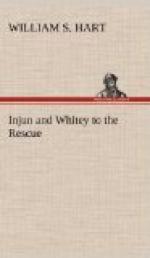Louder sounds of merriment in the bunk house attracted Whitey, and, leaving Injun to gloat over his treasure, Whitey joined the men inside. It may have been that they, too, were glad to have laughter help them to forget the dangers and tragedies of the times. One of them had just told a story—which might have been a story in both senses of the word. Knowing that a yarn usually comes with a cowboy, or a cowboy usually comes with a yarn, Whitey sat down and waited.
I have written that most of the mirth on the Star Circle was aroused by the troubles of others, but that was not true of all of it. On a cracker box sat a dreamy-eyed, short, fat puncher; almost too fat for his job. His nickname was “Single.” He had been married five times. So you can see that Single was a man of experiences. Furthermore, he was always willing to talk about them. He gazed thoughtfully at Injun, who, out in the sunlight, was still admiring his stickpin.
“The two funniest things in th’ world t’ me is mules an’ Injuns,” Single said.
“Injuns don’t never say or do nothin’ funny,” retorted a sour-looking puncher.
“I mean queer, odd,” Single replied.
“What do you know ’bout Injuns?” demanded the other.
“What do I know ’bout ’em!” snorted Single. “My third wife was a half-breed.”
“Gosh, Single!” another puncher broke in. “I knew you’d had plenty o’ wives, but I never knew you’d had no half wives.”
“Th’ wa’n’t nothin’ halfway ’bout her,” Single replied bitterly, “’cept th’ breed.” He seemed lost in gloomy thought, and fearing that he would not talk at all, Whitey spoke.
“That was an inappropriate present to give Injun,” he said.
“An inawhat?” asked Single, whose education had been neglected.
“Inappropriate. I mean it was something you wouldn’t think he’d like,” Whitey explained hastily.
“I dunno,” Single answered. “You can’t never tell ’bout a Injun. He looks stuck on that there present now,” and he nodded toward Injun, who was devouring the stickpin with his eyes. “Mebbe he thinks it’s med’cine,” Single went on.
“Medicine!” exclaimed Whitey.
“Sure—good luck,” said Single. “An’ if he does, you couldn’t pry it off’n him with a steam dredge.”
It had not occurred to Whitey that Injun was superstitious. He never had talked about it—but he never talked much about anything. And an Indian’s “medicine” is superstition, pure and simple. He cherishes some object that he has come upon under conditions that make him think it lucky. Sometimes the medicine man of his tribe performs a rite over this object, and that gives a sort of religious flavor to it, making it almost sacred in the owner’s view. His belief in it is tribal; has come down from his forefathers. It is very hard to shake an Indian’s faith in his medicine.
While Whitey was recalling these facts, which he had heard about, Single’s eyes were narrowing—looking inside his head, one might say, to find there a story that fitted in with Injun’s interest in his gift.




